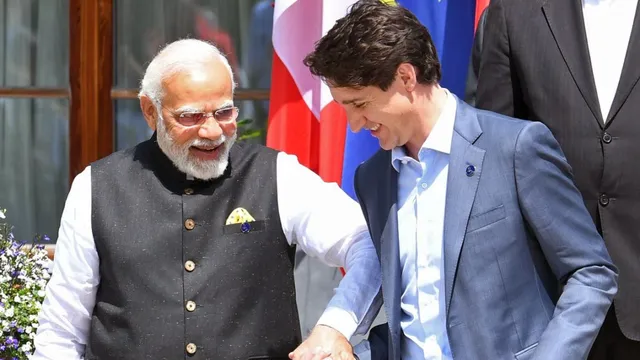- By Abhishek Sheoran
- Wed, 16 Oct 2024 03:28 PM (IST)
- Source:JND
India and Canada are currently experiencing their most strained diplomatic relations to date. Tensions escalated after Canadian Prime Minister Justin Trudeau alleged Indian involvement in the killing of Hardeep Singh Nijjar, a Sikh separatist leader. India, however, categorically denied allegations as motivated, adding that Trudeau was orchestrating the row to woo Sikh voters.
While past disagreements have challenged their bilateral ties, none had previously escalated to such open hostility. In an unprecedented move, India expelled six Canadian diplomats citing concern over their safety. Simultaneously, several Indian diplomats stationed in Canada were also recalled.
India-Canada Ties: Past Bitterness
In 1974, India surprised the world by testing a nuclear device, prompting strong criticism from Canada. Canada accused India of using plutonium obtained from a reactor it had provided for peaceful purposes. This event significantly strained bilateral relations, with Canada halting its support for India’s atomic energy program. However, despite the tensions, neither country resorted to expelling top diplomats—an action both took on Monday.
In 1985, relations between India and Canada further declined following the bombing of an Air India plane, which was reportedly orchestrated in Canada. The attack claimed the lives of at least 329 individuals on board the aircraft, known as Kanishka. Additionally, Canada rejected India's request to extradite the key conspirator, Talwinder Singh Parmar, a Sikh militant who led the Babbar Khalsa terrorist organisation. It was only the beginning of a long-standing diplomatic discord between the two nations.
India-Canada Diplomatic Row: Fresh Contention
During a press conference on Monday, October 14, Prime Minister Trudeau accused Indian agents of conducting covert operations against Canadian citizens, including issuing threats and committing violent acts. Trudeau stated that the RCMP Commissioner possesses substantial and concrete evidence indicating that Indian agents have engaged in activities threatening public safety in Canada. He urged the Indian government to cooperate with Canada and recognise the seriousness and validity of the evidence provided.
India’s Take
India has firmly rejected the allegations, characterising them as unfounded and driven by political motives. The Indian government has accused Trudeau's administration of pursuing a political agenda that supports extremists and terrorists. It underscored that Canada has become a refuge for anti-India groups, allowing them to threaten Indian diplomats and officials. Intel sources said the Trudeau regime was deliberately at loggerheads with India in pursuit of Khalistani votes.
Key Sikh Population And Trudeau’s Battle Against Anti-Incumbency
Canada is home to approximately 770,000 Sikhs, representing the largest Sikh diaspora outside of Punjab, India. Investigations during the Sikh separatist movement, which emerged in India in the 1980s and early 1990s, indicated that the top leaders of militant groups consistently found refuge in Canada. Despite India’s repeated requests for action against these individuals, Canadian authorities made no significant efforts to address the situation.
Besides, Canada’s ruling Liberal Party is reportedly mounting pressure on Prime Minister Justin Trudeau to resign over a plethora of issues. Sources, cited by CBC, said that frustration within the party has reached a critical point, leading to a series of closed-door meetings among discontented MPs. At least 20 lawmakers have allegedly signed a letter advocating for new leadership.

